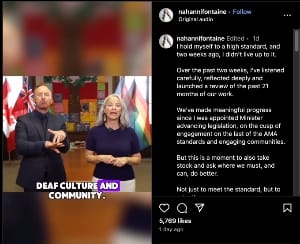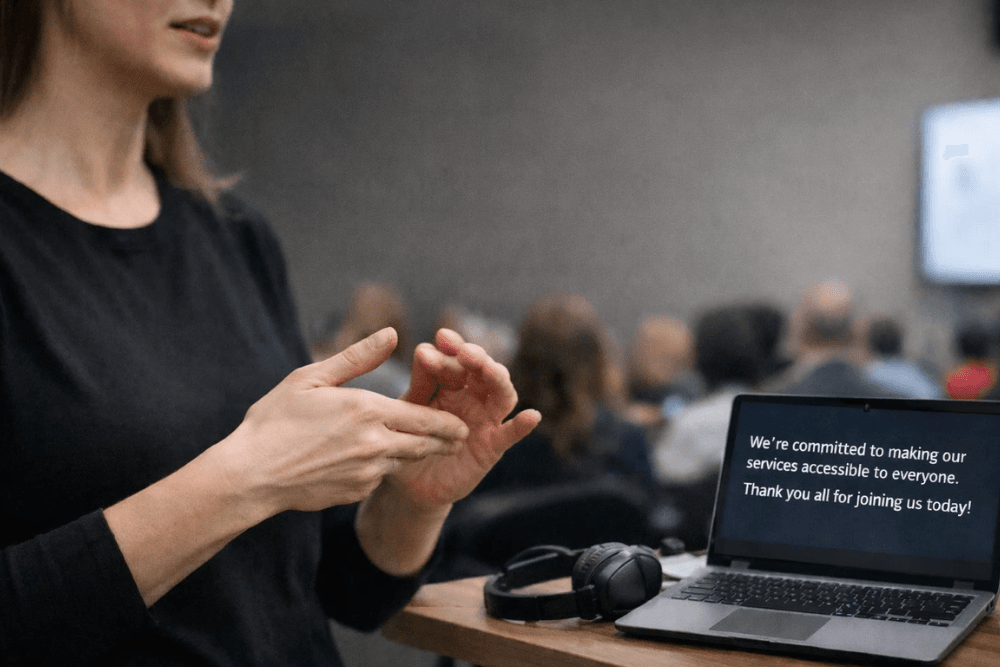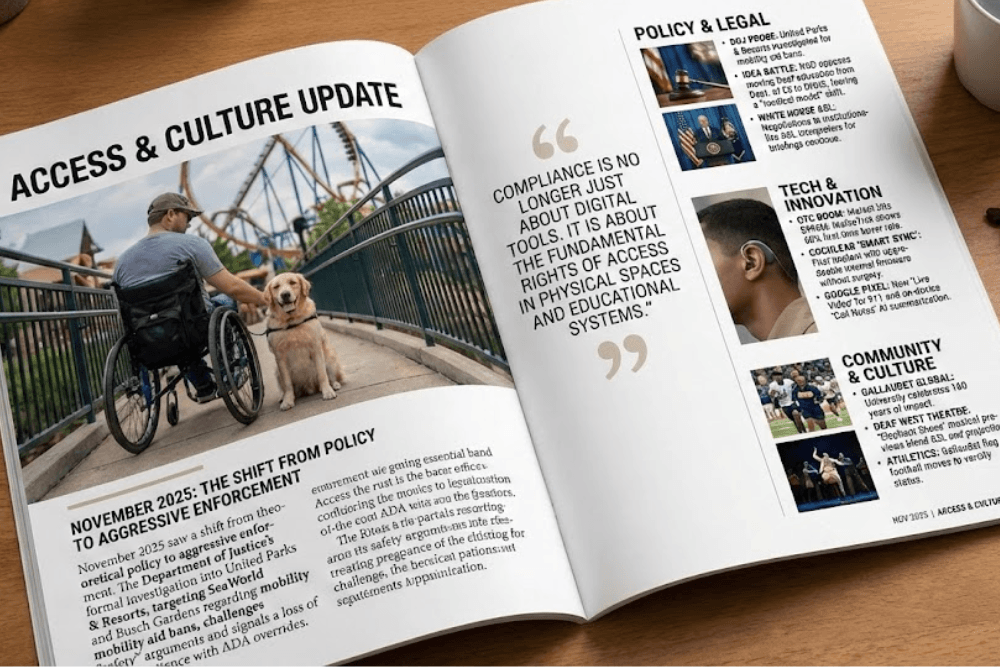This last week (July 8-14, 2025) brought a mix of controversy, celebration, and progress across the ASL and Deaf community landscape. A minister’s misstep led to major policy changes, Mexico opened its first sign language academy, and Hollywood made strides in authentic representation.
From government accountability to technological innovation, here are the key stories that shaped the week in Deaf community news.
Minister’s ASL Gaffe Leads to Training
In a moment that’s turned into a catalyst for change, Manitoba’s Accessibility Minister Nahanni Fontaine made headlines after a June incident where she was caught complaining about an ASL interpreter’s presence on stage during a public event. The video sparked widespread criticism, pointing to gaps in awareness about Deaf culture and the essential role of interpreters.

Fontaine responded with multiple apologies, including a poignant Instagram video where she signed “I’m sorry” in ASL. Going further, she committed to personal Deaf culture training and announced broader policy reforms: mandating ASL interpreters at all government events, hiring more across departments, and appointing a Deaf/Hard of Hearing matriarch to the provincial Matriarch Circle.
This stems from advocacy by Indigenous Deaf individuals, such as Deborah Owczar and her daughter Stephanie Jebb, who have long called for better representation and resources. For the Deaf community, especially Indigenous members, this could bridge intersecting marginalizations, enhancing visibility and access in governance.
While challenges remain like ensuring these pledges translate into action and educating more officials the outlook is hopeful. It shows accountability in action, potentially inspiring global reforms. In a light-hearted vein, it’s a reminder that even leaders can “sign” up for growth, fostering better understanding one gesture at a time.
Mexico Launches First LSM Academy
Mexico marked a historic step forward with the opening of the country’s first Mexican Sign Language (LSM) Academy in the State of Mexico on July 12. Backed by state officials, the academy has already enrolled 200 students and offers structured courses across multiple levels, complete with official certification for signing proficiency.
This initiative addresses longstanding barriers in Deaf education and public services in Mexico, where LSM serves as a vital language for thousands but has lacked formal institutional support. Advocacy efforts over years have pushed for recognition of sign languages as cultural and educational cornerstones.
The impact is profound: It empowers Deaf Mexicans with certified skills that can open doors to better employment, education, and social inclusion, while preserving linguistic identity. Nationwide scaling could follow, though funding and resource sustainability pose ongoing challenges.
Looking ahead, this could influence similar programs elsewhere, contributing to the global movement for sign language rights. Playfully put, it’s like awarding LSM its own “academy” status, elevating Deaf education to new heights.
First BASL Interpretation in Major Film

Streaming giant HBO Max broke new ground with Ryan Coogler’s horror film “SINNERS,” which debuted a Black American Sign Language (BASL) interpretation on July 6 but gained traction in reports this week. BASL advocate Naka Smith handled the signing, infusing cultural depth that standard ASL or captions often miss.
BASL, spoken by about half of Black Deaf Americans, traces its roots to segregated education systems, making this a key win for diverse representation. It follows advocacy from Black Deaf communities demanding authentic accessibility in media.
For viewers, it means more inclusive entertainment that honors linguistic variations, combating isolation and boosting cultural pride. Studios may follow suit, though educating producers on BASL’s nuances remains a hurdle.
The future looks bright for expanded options in streaming. With a nod to inclusion, it’s a true “BASL” hit, showing that even spooky stories can be signed with style.
Gallaudet Athletes in Congress Game
On July 11, four Gallaudet University women’s basketball players shone in a Congressional basketball game, bringing Deaf talent to the forefront of mainstream sports. The diverse group emphasized visibility and advocacy for HoH youth.
Gallaudet, a cornerstone of Deaf education, continues its legacy of promoting ASL and inclusion. This event connects to broader global efforts to empower Deaf athletes.
It fosters community pride and inspires the next generation, though ensuring sustained opportunities beyond one-off events is key. Prospects include more integrated programs, amplifying Deaf voices in athletics.
China’s AI Sign Tools Face Criticism
China’s rollout of AI sign language translators for TV news faced scrutiny on July 10 for inaccuracies and minimal Deaf involvement. Critics highlight cultural oversights in the tech.
Amid rapid AI adoption for accessibility, this underscores the need for stakeholder input to avoid biases. It pushes for ethical standards worldwide.
Challenges involve refining tech for precision, but it could lead to improved guidelines.
NTID Appoints First Woman President
Caroline Solomon became the first woman president of the National Technical Institute for the Deaf (NTID) on July 8. A Deaf marine biologist and ex-Gallaudet dean, she specializes in STEM and ASL technical signs.
This advances leadership diversity in Deaf education, strengthening STEM access.
It inspires future leaders, tackling underrepresentation. Enhanced institutional ties are on the horizon.
Airport Launches ASL App Pilot
Frederick Douglass Greater Rochester International Airport introduced a pilot for the free AIRA ASL app on July 10, developed with input from over 30 Deaf testers.
Building on prior blind-accessibility efforts, it eases travel for 40,000+ local HoH folks.
Reliability is a challenge, but it models airport inclusion.
Looking Ahead
Reflecting on this week’s compelling stories, a clear narrative emerges: progress in accessibility and representation is accelerating, driven by community advocacy and innovative solutions.
Real change happens when the Deaf community’s voices are heard and heeded. From Manitoba’s policy overhaul to Mexico’s educational milestone, progress comes through advocacy, persistence, and authentic partnership.
The momentum is building. Technology is improving, institutions are listening, and representation is expanding. But sustaining this progress will require continued vigilance, funding, and most importantly, keeping Deaf voices at the center of every conversation about accessibility and inclusion.
What stories will next week bring? The Deaf community continues to shape the narrative, one sign at a time.







